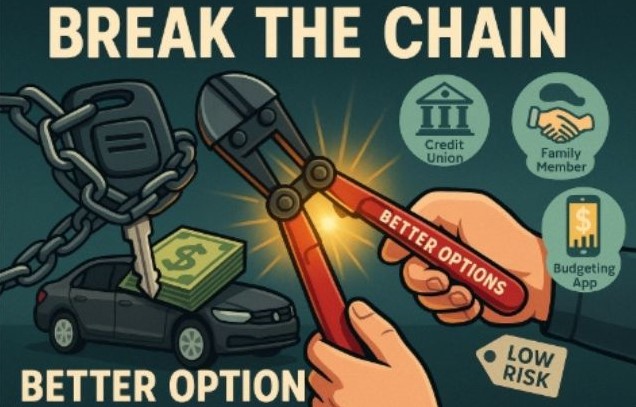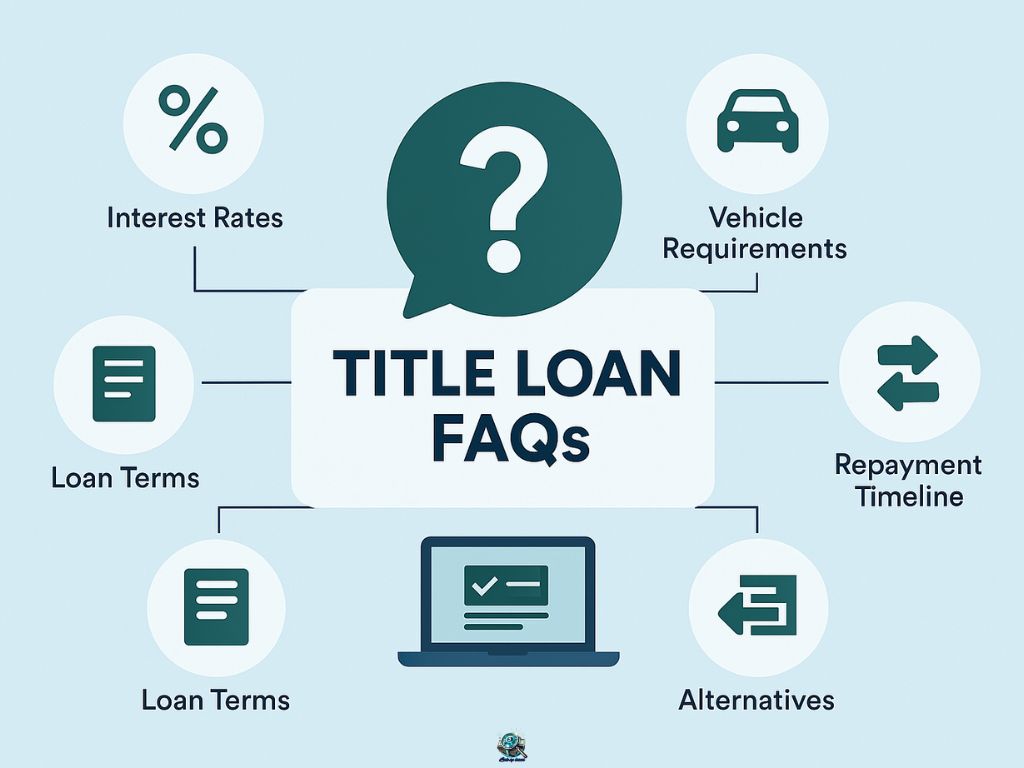Introduction: When a Car Becomes a Lifeline
When you’re out of options but still own your car, a title loan can look like the last door open. It feels fast and easy. It feels like something especially when the rent’s due, the fridge is empty, or a medical bill just blindsided you.
And that’s exactly when car title lenders step in. They promise quick cash, no credit checks, and no judgment. Just hand over your title, get approved in minutes, and drive away with money in your account.
But what they don’t highlight upfront is what happens next.
Triple-digit interest rates. Hidden fees. And the very real risk of losing your car even if you’re just one payment behind.
This guide breaks it all down. You’ll learn how car title loans work, what they really cost, when they might make sense, and what alternatives could save you money and your vehicle.
If you’re thinking about putting your title on the line, read this first.
Key Takeaways
- Car title loans let you borrow fast using your vehicle as collateral but your car is on the line if you can’t repay.
- No credit check is required, but interest rates are often sky-high, with APRs that can exceed 200%.
- Loan amounts are usually 25% to 50% of your car’s value, and terms are typically 30 days or less.
- Failure to repay can lead to immediate repossession, often without much warning.
- Safer alternatives exist, including personal loans for bad credit, credit union options, and other secured loans that don’t risk your transportation.
Disclaimer: This site contains affiliate links. If you make a purchase, we may earn a commission at no extra cost to you.

What Is a Car Title Loan?
A car title loan is a short-term, high-interest loan that uses your vehicle as collateral. You hand over the title not the car and in exchange, the lender gives you a lump sum of cash, typically due within 15 to 30 days.
It’s not the same as a traditional auto loan.
With a standard auto loan, you’re financing a car purchase and paying it off over time. With a car title loan, you’re borrowing against a car you already own, usually one that’s fully paid off.
The lender holds the title during the loan term. You keep the car and continue driving it unless you miss a payment.
In that case, the lender has the legal right to repossess and sell your vehicle to recover the debt.
Loan amounts usually range from $500 to $5,000, depending on the car’s resale value. The more your vehicle is worth, the more you can borrow but the risk stays the same: If you can’t repay, you lose your car.


How the Car Title Loan Process Works (Step by Step)
Car title loans are marketed as fast and easy and in many ways, they are. But that simplicity can be misleading if you don’t fully understand what’s happening behind the scenes.
Here’s how the typical process works, from start to finish:
1. Apply Online or In Person
You can apply through a website or by walking into a storefront lender. Either way, you’ll need to provide basic personal information and details about your vehicle year, make, model, mileage, and condition.
2. Submit Required Documents
This usually includes:
- Your vehicle title (in your name, lien-free)
- Government-issued ID
- Proof of income
- Proof of residence
- Photos of your car (if applying online)
3. Vehicle Valuation
The lender assesses your car’s current market value often using a mix of internal formulas, Kelley Blue Book data, and visual inspection (or photo review).
This value determines how much they’re willing to lend typically 25% to 50% of the car’s resale value.
4. Review and Sign the Loan Agreement
This is where many borrowers move too fast.
Before signing, make sure you understand:
- The APR and total repayment amount
- The loan term (usually 15 to 30 days)
- All fees, including late, origination, or processing fees
- What happens if you miss or delay a payment
5. Receive Your Funds
Once approved, the lender issues your money usually by direct deposit, cash, or prepaid debit card.
Funding can happen within a few hours to one business day.
6. Make Payments and Reclaim Your Title
If you repay on time, the lender returns your vehicle title and closes the loan.
If you can’t pay, you may be hit with rollover fees or face repossession of your car.

🚗 How They Work: Quick Summary
| Step | What Happens | What You Provide | Timing | Watch Outs |
|---|---|---|---|---|
| 1. Apply (Online/In-Store) | Lender reviews basics. | Contact info; car details. | Minutes–hours | Pre-approvals can drop after review. |
| 2. Document Check | Ownership and ID confirmed. | Title, ID, proof of income/residence, photos. | Same day | Any lien/name mismatch delays or reduces offer. |
| 3. Vehicle Valuation | Offer set as % of resale value. | Car inspection or photos. | Same day | Expect ~25–50% of resale value. |
| 4. Loan Agreement | APR, fees, terms set; lien applied. | Signed contract; bank info. | Minutes | Short terms; rollover/repo clauses — confirm total due. |
| 5. Funding | Money released. | Bank or payout method. | Hours–1 biz day | Activation/processing fees may apply. |
| 6. Repay & Title Release | Pay in full; lien removed. | Scheduled payment. | 15–30 days | Late/rollover fees stack; repossession risk. |
Pro Tip: Check your car’s resale value (KBB / Edmunds) and confirm APR, fees, and total repayment before signing.

How much can you borrow against a car title?
The amount you can borrow depends on a single factor: your vehicle’s current resale value.
Most title lenders advance 25 – 50 percent of what they believe your car would sell for today, not what you paid for it and not what you think it’s worth.
That gap is intentional. Lenders protect themselves by valuing conservatively and lending below that number in case they need to repossess and resell the car.
Key factors that shape your loan amount
- Vehicle type: Trucks, SUVs, and newer luxury models qualify for more; older sedans usually less.
- Make, model, and year: Later-model, reliable vehicles retain higher value.
- Mileage: Lower mileage means less wear and a stronger appraisal.
- Condition: Visible damage or mechanical issues reduce what you can borrow.
- Market demand: Some models simply sell faster in your region.
- State limits: Several states cap title-loan amounts or maximum APRs.
Example: a typical title-loan offer
- Vehicle market value: $8,000 (per Kelley Blue Book)
- Lender’s advance rate: 40 percent
- Estimated loan: $3,200
You keep the car and continue driving it, but the lender holds your title until the balance is repaid. Miss a payment, and repossession rights activate quickly.
Common misconception
“My car is worth a lot, so I’ll get a large loan.” Not necessarily.
Most lenders use wholesale or auction pricing, then lend only a portion of that figure. A $10,000 retail car might appraise at $7,000 for collateral purposes leaving an offer near $3,000.
Pro tip: Before applying, check your vehicle’s estimated value on Kelley Blue Book or Edmunds, verify that the title is clear, and multiply the result by 0.25 – 0.50 to gauge a realistic borrowing range. If repayment looks tight at that amount, explore safer alternatives first.
🚗 Car Title-Loan Snapshot
| Metric | Typical figure | Source |
|---|---|---|
| Average APR | ~300% | Pew Research Center |
| Annual fees on $1,000 loan | ≈ $1,200 | Pew Research Center |
| Borrowers who lose their car | 1 in 5 | CFPB |
| Repossession rate (annualized) | 6 – 11% | Pew Research |
| Loans rolled over at least once | ≈ 80% | Center for Responsible Lending |
Based on 2024 – 2025 data from Pew Research Center, CFPB, and CRL, most title-loan borrowers repay more in fees and interest than they originally borrowed, with repossessions affecting roughly one in five loans.
Bottom line
Even if your car holds value, expect to borrow only a fraction of it. Title-loan advances are designed to protect lenders not borrowers and the costs rise fast if you miss a payment. Before handing over your title, check your numbers, confirm repayment ability, and consider lower-risk options such as credit-union PALs or personal loans for bad credit.

The true cost of car title loans: interest rates and hidden fees explained
Car title loans are sold as short-term, quick-cash solutions, but the simplicity ends where the contract begins.
Behind every “fast approval” promise lies one of the highest-cost borrowing structures in consumer finance.
Many borrowers only discover the full cost when the first payment is due and by then, the numbers don’t just add up, they multiply.
Why title loan interest rates skyrocket
Title lenders take on high default risk and use that to justify extreme pricing. But the mechanics go beyond risk; they rely on short repayment windows and compounding interest to maximize returns.
Typical annual percentage rates (APRs) range from 150 – 300 percent, though many states report even higher averages.
That’s because most lenders quote monthly rates, not annual ones. A 25% “monthly” rate translates into a 300% APR the true cost once you annualize it.
Borrow $1,000, and after 30 days, you could owe $1,250 or more. Miss one payment, and late fees or renewals can push that balance well beyond the original amount within weeks.
These loans aren’t structured to end quickly, they’re structured to roll over, again and again, until repayment becomes almost impossible without outside help.
💰 Common Hidden Fees That Raise the Real Price
Even if the interest rate seems clear, fees are often layered in ways that make the total cost hard to track.
| Fee Type | Typical Range | What It Means |
|---|---|---|
| Origination Fee | 5 – 10% of loan amount | Charged just to process or “open” your loan. |
| Late Payment Fee | $10 – $30 per day or week | Accrues quickly once the due date passes. |
| Rollover or Renewal Fee | $50 – $100 per extension | Adds new interest instead of reducing principal. |
| Repossession Costs | $200 – $500+ | Covers towing, storage, and auction if you default. |
| Lien Recording Fee | $15 – $50 | Charged for filing and removing the lien from your title. |
⚠️ Note: Even small fees stack fast. A few rollovers can double what you owe — not because of interest, but because of layered charges you never saw coming.
Why the structure traps borrowers
Short terms, daily interest accrual, and no grace period create a mathematical trap for anyone who doesn’t have steady income.
Miss one payment, and the lender can apply new fees, extend the loan, and capitalize unpaid interest effectively starting over each cycle. It’s not borrower failure. It’s design.
According to national consumer lending data, over 80% of title loans are renewed at least once, and nearly 1 in 5 ends in repossession.
3 numbers to check before signing
Before accepting a loan, write these three questions on paper and make the lender answer clearly:
- Total repayment: “If I pay this on time, what’s the exact dollar amount I’ll owe?”
- Late payment cost: “What happens if I’m one week late?”
- Renewal structure: “If I can’t pay in full, what’s the cost to extend?”
If any answer is vague, incomplete, or missing, that’s not a red flag, it’s a stop sign.
According to CFPB and Pew Research data (2024 – 2025), title-loan borrowers pay an average of $1,200 in fees on a $1,000 loan, with APRs exceeding 250% in many states and repossession rates between 6 – 11% annually.
Bottom line
Title loans don’t just charge high interest; they’re structured to keep borrowers paying it.
Every fee, rollover, and delay strengthens the lender’s position while shrinking yours.
Before signing anything, calculate the total repayment, not the monthly payment. If the lender can’t show it clearly, the safest move isn’t to negotiate, it’s to walk away.

What Happens If You Don’t Repay the Loan?
With a car title loan, the stakes aren’t just financial, they’re physical.
Miss a payment, and your car could disappear overnight.
Lenders aren’t bluffing when they say your vehicle is collateral. If you default, repossession is not just a possibility, it’s often the first move they make.
1. Late = Trouble
Most title loan contracts don’t offer much breathing room.
If your payment is late by even a few days, you may face:
- Daily late fees
- Rollover offers (with more interest added)
- Immediate notices of default
And remember there’s no credit score buffer here. Your car is the credit.
2. Repossession Begins
If you fail to repay, the lender can send a repo agent to take your car without needing to go to court in many states.
There’s often no warning. No knock on the door. Just an empty driveway.
Some lenders even install GPS trackers or starter interrupt devices to make recovery easier.
3. Your Car Is Sold
Once repossessed, your car is typically auctioned off.
The lender keeps what you owe and depending on your state, may or may not be required to return the surplus.
If they sell your car for less than the loan amount and fees? You might still owe the balance.

What Most Borrowers Don’t Expect:
- Repossession happens fast sometimes without a court order
- You lose not just your transportation, but often your ability to earn income
- The emotional and logistical fallout is huge especially for working families or single parents
Bottom Line: If you’re even slightly unsure whether you can repay the loan on time and in full, this is not the kind of debt to take on.

When Might a Car Title Loan Make Sense?
Let’s be real: most people should avoid car title loans entirely. But that doesn’t mean they’re never appropriate.
There are rare situations where the speed, access, and simplicity of a title loan can provide a short-term bridge if you fully understand the risks and have a solid plan to repay.
Here’s when it might make sense:
You Own Your Car Free and Clear
No liens. No other lenders involved.
The vehicle is in your name and fully paid off giving you real equity to leverage.
You Have No Access to Traditional Credit
When your credit score is low. You’ve been denied personal loans or credit cards. You’ve already exhausted borrowing from friends or family.
In that case, a title loan might be your only option not the best one, but the last one.
You Have Verifiable, Reliable Income
A title loan is only “temporary” if you have money coming in to pay it back.
If your income is inconsistent, or you’re between jobs, this type of loan can spiral fast.
You Only Need the Loan for a Few Days or a Week
The shorter the time you carry the loan, the lower the interest.
If you know you can repay it quickly for example, after a paycheck or invoice clears, you’ll limit your exposure to fees and risk.
Even Then, It’s a Gamble
- Your job could fall through
- A medical expense could hit
- The lender could delay funding or charge extra fees
Only borrow what you’re 100% confident you can repay. And always have a backup plan.
Reminder: This isn’t long-term debt relief. It’s an emergency tool one that comes with a sharp edge.
🛡️ At a Glance: Pros & Cons of Car Title Loans
Here’s a quick overview of the main advantages and risks borrowers should know before using a car title loan.
| Pros | Cons |
|---|---|
| Fast approval and same-day funding | Extremely high APRs (often 150%–300%) |
| No credit check required | Risk of losing your vehicle if you default |
| Simple application process | Short repayment terms (usually 30 days or less) |
| Accessible for borrowers with poor credit | Fees, rollovers, and hidden costs can trap borrowers in debt |
💡 Quick takeaway: Car title loans offer instant cash when you have no credit options — but they come with some of the highest costs and risks in short-term lending.

Safer Alternatives to Car Title Loans
Before you hand over your car title for quick cash, pause because the real cost often comes after the money hits your account. Losing your vehicle isn’t just a financial setback; it can disrupt your job, your family life, and your independence.
The good news? You still have options. Below are safer, more sustainable alternatives that can provide relief without putting your transportation or peace of mind at risk.
1. Personal Loans for Bad Credit
If you’re struggling with credit challenges, a personal loan can offer a structured, lower-risk path to funding.
Many online lenders, credit unions, and fintech platforms now design personal loans specifically for borrowers with low or rebuilding credit scores.
They may take a few days to fund, but here’s why they’re worth it:
- APRs typically range from 6% to 36%, far below the triple-digit rates of title loans.
- Repayment terms last from 12 to 60 months, giving you time to breathe.
- You keep your vehicle, no collateral, no repossession risk.
Pro Tip: A well-timed personal loan can also help rebuild credit when managed responsibly.
➔ Related Resource: Learn more about personal loans for bad credit and how to qualify responsibly.
2. Credit Union Loans and Payday Alternative Loans (PALs)
If you’re part of a credit union or can join one this is one of the best options available.
Credit unions often offer Payday Alternative Loans (PALs), small emergency loans designed to help members avoid predatory debt cycles.
Here’s why PALs and credit union loans stand out:
- Capped APRs: By federal law, PAL interest rates can’t exceed 28%.
- Shorter terms, not traps: Repayment usually runs 1–6 months, with no rollovers.
- Built for members: Approval is often based on relationship history, not just credit score.
They’re not instant, but they’re fair and they’re built to keep members out of trouble, not in it.
3. Secured Personal Loans (Without Using Your Car)
If you have some savings or another asset, a secured personal loan can be a smart, lower-cost middle ground.
Instead of using your vehicle as collateral, you pledge:
- A savings account,
- A certificate of deposit (CD), or
- Another form of cash security.
This keeps your car safe while still giving you access to a manageable, short-term loan often with interest rates under 15%.
⚙️ Example: Borrowing $2,000 secured by a savings account may cost under $150 in interest over a year compared to over $2,000 in fees from a 200% APR title loan.
4. Borrowing from Friends or Family (with a Written Agreement)
It’s never easy to ask for help but when done right, it can be the lowest-cost, lowest-risk path forward.
If you go this route:
- Create a simple written repayment plan, even a short note builds trust.
- Keep communication transparent.
- Treat it like a real loan, not a handout.
You avoid interest, paperwork, and credit damage and most importantly, no one comes for your car.
5. Local & Government Emergency Assistance Programs
If you’re facing urgent needs like rent, food, or utilities, look beyond lenders entirely.
There are community-based programs designed to help bridge short-term hardship:
- Local nonprofits and churches often provide small emergency grants or transportation vouchers.
- Community action agencies offer utility, rent, or food assistance.
- Government programs (city, county, or state) sometimes issue one-time hardship payments.
Start by dialing 2-1-1 or visiting your local government’s website to locate verified aid programs in your area.
These funds may take longer to process but don’t require repayment and can protect your stability without adding new debt.
⚖️ Bottom Line: Choose Dignity Over Desperation
Title loans are easy to get but hard to escape. Alternatives might take more time or paperwork, but they protect what matters most: your car, your credit, and your future.
Think of these safer options as bridges that lead you forward, not traps that pull you back.

Title Loan Providers vs. Safer Alternatives (2025 Comparison)
| Provider / Option | Typical Loan Amount | APR / Fees | Repayment Terms | Key Risk or Benefit |
|---|---|---|---|---|
| TitleMax (title lender) | $100 – $10,000 | 100%–300%+ | 15–30 days; rollovers allowed | 🚨 High repossession risk |
| LoanMart (title lender) | $1,000 – $25,000 | 80%–200%+ | Varies; short-term | ⚠️ High cost; title required |
| Credit Union PAL (Payday Alternative Loan) | $200 – $2,000 | ≤ 28% (by law) | 1–6 months | ✅ Safe, affordable short-term loan |
| Online Personal Loan (LendingClub, Upgrade, etc.) | $1,000 – $40,000 | 6%–36% | 12–60 months | 💡 Predictable, fixed monthly payments |
| Peer-to-Peer Lending (Prosper, Upstart) | $1,000 – $35,000 | 6%–35% | 3–5 years | ✅ Lower rates for good credit |
| Yendo Credit Card (title-secured line) | Up to $10,000 | ~24% – 35% + fees | Revolving monthly | ⚙️ Lower APR, still secured by car |
Pro Tip: Always compare total repayment costs not just monthly rates. The difference between a title loan and a safer alternative can easily exceed $1,500+ on a $1,000 advance.

Final Thoughts: Don’t Trade Your Car for a Crisis
When money is tight and time is shorter, car title loans can feel like the fastest way out. But fast doesn’t always mean safe and in this case, it rarely does.
Your car isn’t just a vehicle. It’s your way to work. Your connection to family. Your independence.
And once you sign it away, getting it back isn’t guaranteed. So if you’re considering a car title loan, pause for one more moment.
Ask yourself:
- Do I fully understand the costs and risks?
- Can I repay this on time, no matter what?
- Have I looked at safer options even if they take a little longer?
Because once your title is gone, your options narrow fast.
Protect your car. Protect your future. Use this loan only if you truly have no other choice and only if you’re 100% ready to repay.

Frequently Asked Questions (FAQ)
Can I get a car title loan if my vehicle isn’t fully paid off?
It depends on the lender. Most require that your car be fully owned with no active liens. Some may consider near-paid-off vehicles, but the loan amount will be lower and the terms more restrictive.
Do I need a credit check to qualify for a car title loan?
No. Most car title lenders do not check your credit score. They rely on the value of your vehicle and your ability to repay. However, some lenders may still verify your income.
Can I still drive my car during the loan term?
Yes, as long as you’re making payments on time. The lender holds your title, not your car. But if you default, they have the legal right to repossess it.
What happens if I’m one day late on a payment?
Some lenders charge immediate late fees, while others may offer a brief grace period. If you’re late, contact the lender right away to avoid penalties or repossession proceedings.
Do car title loans show up on my credit report?
In most cases, they don’t unless the lender reports to credit bureaus (which is rare) or you default and the account is sent to collections. That said, repossession or legal action can still impact your financial record.
How fast can I get the money?
If everything is submitted correctly, some lenders can fund the loan within 24 hours. Online applications tend to move faster, but funding time still depends on the lender, your documentation, and your bank.
Can I refinance a title loan to avoid repossession?
Sometimes. A few lenders offer refinancing, but terms may be just as risky. You’ll still need to repay the full balance plus added fees.
What happens to my car insurance during a title loan?
You must keep full coverage. Some lenders require listing them as a lienholder. If your coverage lapses, your car and loan are at risk.
Do I lose equity in my vehicle when I take out a title loan?
Not right away. But if you default or roll over the loan repeatedly, you can lose your car and any equity you had in it.
1 Comment
Emergency Car Title Loans: Fast Cash or a Dangerous Trap? - Look Up Loans · April 18, 2025 at 3:45 pm
[…] Next: You can read more about how car title loans work here. […]